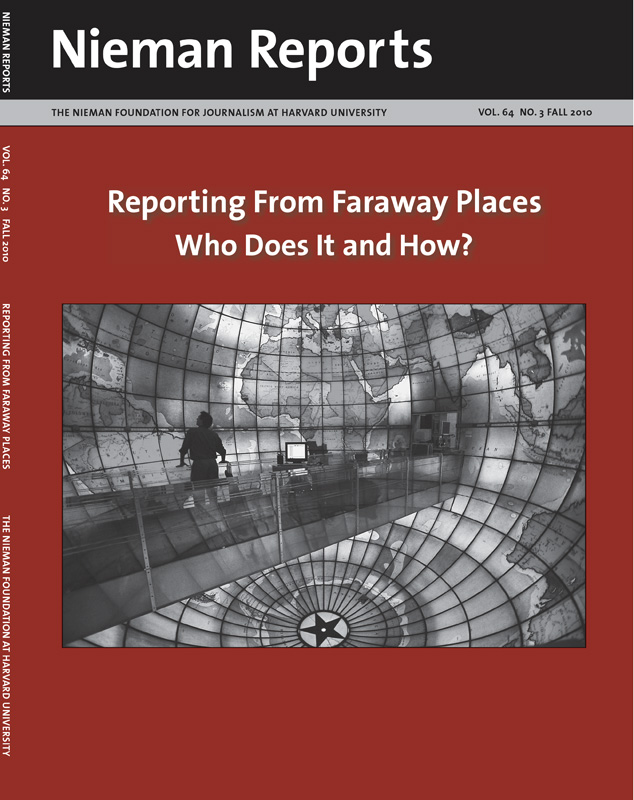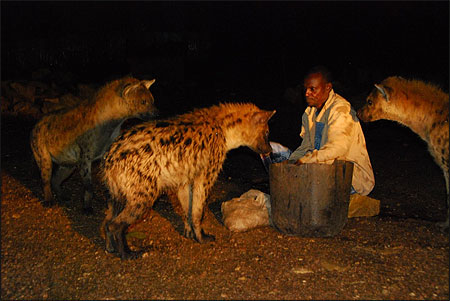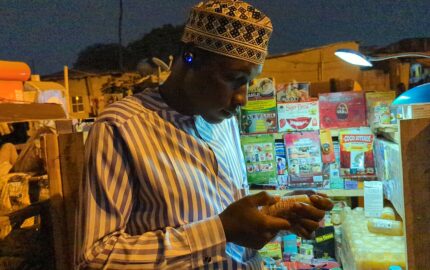

The care and feeding of hyenas on the streets of Harar, Ethiopia was the subject of a story on GlobalPost. Photo by Prasanna Muralidharan/GlobalPost.
In Morocco, marijuana growers protest, angered by the escalating pressure to pay bribes to local police to be allowed to grow their illegal crop.
On the streets of Harar, Ethiopia, packs of hyena prowl at night, posing a danger to the city’s farm animals, but some residents—the “hyena whisperers”—feed them scraps of goat meat and, over time, befriend them.
And Dakar, Senegal is a destination of choice for European women looking for “sun, sea and sex,” creating a market for sex tourism as men earn favors—and sometimes money—through these liaisons.
These are among the recent dispatches that GlobalPost has published from Africa as part of our daily online international news coverage. GlobalPost’s approach to stories from Africa is the same one we bring to reporting from the rest of the world.
Stories are sent to us by a worldwide network of 50 journalists, who are under contract to GlobalPost to deliver two to four stories per month for which they are paid. In addition, correspondents receive shares of stock in GlobalPost, giving them a stake in the for-profit company’s future. In most months, about 125 freelance journalists file stories for GlobalPost. And their reporting focuses more on what is happening with people than governments or policy. In addition, bloggers publish posts on our site without any editorial review, and this is explained so that readers know how the content got there.
As the editor in charge of coverage from Africa, I have correspondents filing regularly from 10 countries, and I also receive stories from other African countries. What a correspondent sends me needs to be tightly focused, provocative, crisply written, and to the point—usually about 600 to 800 words. A lot can be told in that length, but it leaves no room for waffling. To make it work requires an attention-grabbing lede, informative nut graf, sharply focused quotes, solid facts, and a satisfying finish.
Conventional wisdom would tell us that finding—and maintaining—an Internet audience for African news is tough, if not impossible. For decades, news from Africa has been routinely relegated to the bottom of the foreign news pile, and that was when newspapers and networks actually had bureaus and covered global news. To put it bluntly, Africa is a continent filled with fascinating and important stories, and what we are discovering is that an audience will be there to read them when we give them the right connecting threads through our reporting and presentation.
We are doing this by producing stories that are fun to read. We work hard to make our stories break out of the “should read” category and into the “want to know” one. Think about it this way: Someone might come across a lengthy story about Sudan and think, “I should read that” and bookmark it online (or clip it in print) to get to later. That pile of worthy stories quickly grows, and soon becomes daunting, even guilt inducing, until finally either the paper goes into the recycling bin or the bookmark recedes from memory.
In contrast, GlobalPost stories are geared to attract readers’ attention immediately. They aren’t homework; they are quick, informative, interesting pieces to be consumed then and there. The appeal comes from the lively, offbeat topics that elicit a “who knew?” reaction, but this is coupled with efforts we make to put a GlobalPost twist on important international stories of the day—the ones in the news that people are talking about.
With World Cup soccer in South Africa—being played on the African continent for the first time—GlobalPost brought together the reporting of correspondents in the 32 participating countries. The question uniting them was this: What does this World Cup team mean to this country? From Germany came word of how this is the first time its team had an ethnic diversity that reflected the rise of its immigrant population. And the dispatch from Spain told how the national team showed a new unity of players from that country’s bitterly divided Basque, Catalan and other regions. Likewise, stories from the other countries illuminated this interplay between soccer and politics, economics and popular culture.
Logistically, it was a challenge for our small editorial team in our home office in Boston, Massachusetts to gather, edit, design the graphics, and link these 32 stories together on our site, but the result was satisfying and in synch with how we use on-the-ground reporting to inform fresh international coverage. During the weeks of the tournament, we continued to publish a range of illuminating articles from South Africa, in one case exploring whether the new stadiums built for the World Cup would become white elephants.
Another unifying theme emerged in Rainbow Planet, our series about what’s happening with gay rights in many countries. GlobalPost’s correspondents wrote about the rights of homosexuals in countries such as Brazil, Japan, South Africa, Saudi Arabia, and France. Along with finding out how politically charged the issue is in so many countries, it was fascinating to learn how this controversial issue is affecting local events.
In addition to these larger special projects, GlobalPost produces daily stories about politics and economic developments, culture and technology, health and education. Because of the quick and constant pace of our coverage, the pressure to run more comprehensive and lengthier stories is reduced; our correspondents know, as we do, that a tightly focused and informative dispatch works best for our audience.
A year and half after our launch, GlobalPost attracted more than 900,000 unique visitors from 222 countries in May and again in July. The company expects that by year’s end the total number of users will be close to 10 million. Of those who stop by GlobalPost, nearly half return.
We’re heartened by our progress and recognize that continued success relies on finding the revenue streams that will sustain our worldwide operation. Included in our business strategy is advertising revenue, which is the most important part of our long-term financing; the syndication of our content through partnerships with media entities; the backing of individual investors; and our paid memberships, which provide extra content for a price. GlobalPost members now pay $2.95 per month or $29.95 a year. Convincing one percent of our site’s monthly visitors to become members would generate $270,000 a year.
At a time when most news organizations are moving away from foreign news, GlobalPost is taking advantage of the Internet to get reporting, photography and multimedia presentations out to readers quickly and efficiently. And we are taking advantage of social media and search engines to reach out to new audiences. It is a testing time for international news, as it is for journalism. At GlobalPost we are finding it is also a time of great opportunity and new solutions and we relish our role of providing lively foreign reporting for a global, digital audience.
Andrew Meldrum, a 2008 Nieman Fellow, is senior editor at GlobalPost. From 1980 to 2007 he worked in Zimbabwe and South Africa, writing for The Guardian, The Economist, and several other publications.


